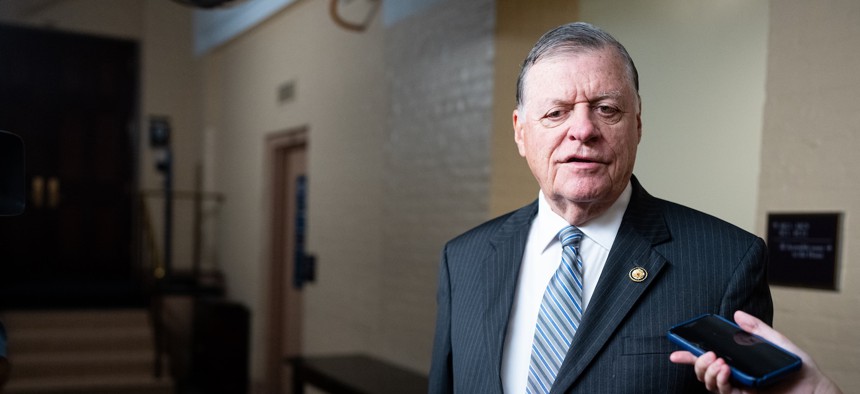
Rep. Tom Cole, R-Okla., heads to the House Republican Conference caucus meeting in the U.S. Capitol on Sept. 16, 2025. Cole is chairman of the House Appropriations Committee. Bill Clark/CQ-Roll Call, Inc via Getty Images
House GOP unveils 7-week stopgap funding bill, Dems say it makes shutdown more likely
Congressional Democrats are not backing down from their funding bill demands even as Republicans move forward with a plan to avert a shutdown.
House Republicans on Tuesday put forward a short-term funding measure to keep federal agencies open through Nov. 21, though Democrats quickly said the move undermined ongoing bipartisan talks.
Republicans lauded the measure as “clean” and free of "poison pills,” though they did not negotiate its provisions with their Democratic colleagues. House leadership is looking to quickly move forward with the bill before current funding expires at the end of the month, with the House Rules Committee set to meet on the continuing resolution on Tuesday and a full vote on the floor expected by the end of the week.
“Keeping our government open and working for the American people is not a partisan issue, and this clean, short-term funding extension reflects that,” said Rep. Tom Cole, R-Okla., who chairs the House Appropriations Committee. “As we continue advancing FY26 conference negotiations, this measure prevents the chaos of a shutdown and allows us to stay focused on restoring regular order.”
Rep. Rosa DeLauro, D-Conn., the top Democrat on Cole’s committee, and Sen. Patty Murray, D-Wash., who leads Democrats on the Senate spending panel, said the decision from House Speaker Mike Johnson, R-La., to put forward the stopgap bill undermined bipartisan, bicameral talks that had been underway. The move has put Congress on “the brink" of a funding lapse, they said.
“House Republican leadership has walked away from negotiations and are now threatening a shutdown by trying to jam through a funding bill on their terms alone,” the appropriators said.
Democratic leadership said last week that their caucuses were united in their demand that Congress, as part of any funding bill, extend enhanced health care subsidies provided to millions of Americans through the Affordable Care Act. A clean CR that does not address the looming health care cuts “won’t get our votes, plain and simple,” Senate Minority Leader Chuck Schumer, D-N.Y., said.
By pushing a spending bill that expires before Thanksgiving, however, Johnson is seeking to separate the issues and allow time for Congress to address the health care concerns after it deals with fiscal 2026 appropriations.
Both the House and Senate have begun passing full-year funding measures for fiscal 2026, though only the Senate has done so with broad, bipartisan support. The House has pushed to create a conference committee in which members of the House and Senate would hash out the differences between the annual spending bills both chambers have passed, but the Senate has yet to sign off on such a plan.
House Republicans can afford to lose only a couple votes if Democrats stand united in opposition to the CR and the measure would require significant Democratic support in the Senate. Federal agencies are currently operating under a year-long CR, meaning they are still funded at fiscal 2024 levels.
The new bill provides extra funding and extended authorization for a slew of programs to continue, while also providing $30 million for lawmaker security. The measure would ensure agencies have adequate funding to avoid furloughing any employees.
Share your news tips with us: Eric Katz: ekatz@govexec.com, Signal: erickatz.28
NEXT STORY: Cuts to CFPB staffing could complicate enforcement of Trump’s executive order on ‘debanking’







